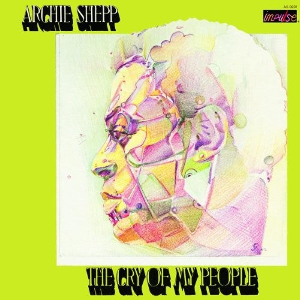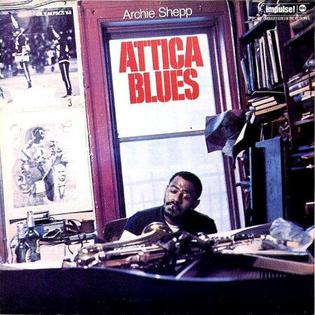
Attica Blues is an album by avant-garde jazz saxophonist Archie Shepp. Originally released in 1972 on the Impulse! label, the album title refers to the Attica Prison riots.

Blasé is an album by jazz saxophonist Archie Shepp recorded in Europe in 1969 for the BYG Actuel label.
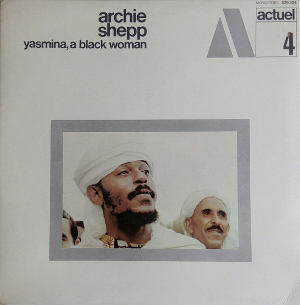
Yasmina, a Black Woman is a jazz album by Archie Shepp, recorded in 1969 in Paris for BYG Actuel. It features musicians from the Art Ensemble of Chicago. The first track, giving its title to the album, is a long free jazz piece by an 11-piece orchestra; in it, the references to Africa that Shepp had experimented with only a few weeks earlier in Algiers are to be found in the use of African percussion instruments, or the African incantations sung by Shepp himself at the beginning of the track. The other two pieces, a homage to Sonny Rollins written by trombonist Grachan Moncur III and a standard, played by a more traditional quintet and quartet respectively, are more reminiscent of the hard bop genre, although the fiery playing of the musicians, notably Shepp himself, gives them a definite avant-garde edge. It was originally issued on CD by Affinity, mastered from an incredibly noisy vinyl source and later reissued by Charly from the original master tapes.
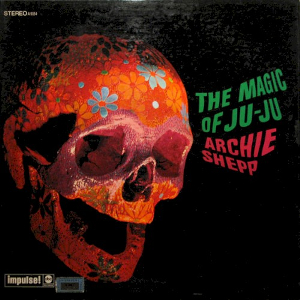
The Magic of Ju-Ju is an album by Archie Shepp released on Impulse! Records in May 1968. The album contains tracks recorded by Shepp, Martin Banks, Mike Zwerin, Reggie Workman, Norman Connors, Frank Charles, Dennis Charles, Ed Blackwell and Beaver Harris in April 1967.
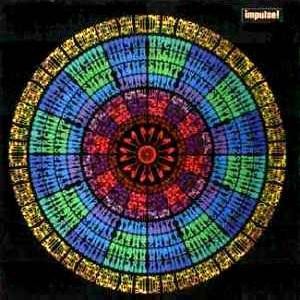
The Way Ahead is an album by Archie Shepp, released on Impulse! Records in 1968. The album contains tracks recorded by Shepp, Jimmy Owens, Grachan Moncur III, Walter Davis Jr., Ron Carter, Roy Haynes and Beaver Harris in January 1968 with two additional tracks featuring Charles Davis, Dave Burrell and Walter Booker recorded in February 1969, and first released on Kwanza (1974), added to the CD release.

Things Have Got to Change is an album by avant-garde jazz saxophonist Archie Shepp released in 1971 on the Impulse! label. The album features a performance by Shepp with a large ensemble and vocal choir. The album "solidified the saxophonists reputation as a soulful, yet radical free jazz artist motivated by social commentary and cultural change".

Kwanza is an album by Archie Shepp released on Impulse! in 1974. The album contains tracks recorded from September 1968 to August 1969 by Shepp with four different ensembles.
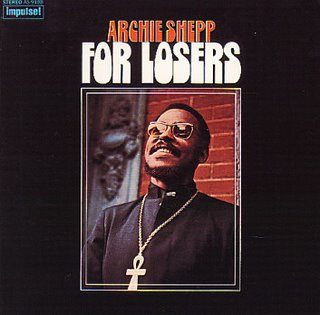
For Losers is an album by Archie Shepp released on Impulse! in 1970. The album contains tracks recorded from September 1968 to August 1969 by Shepp with three different ensembles. The AllMusic review by Rob Ferrier states "for anyone wishing to understand the music and career of this brilliant musician, this is an undervalued piece of the puzzle".

There's a Trumpet in My Soul is an album by avant-garde jazz saxophonist Archie Shepp released in 1975 on the Arista Freedom label.
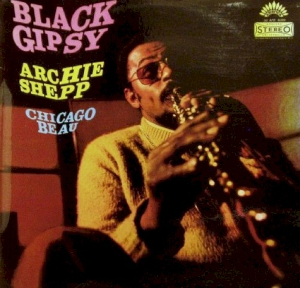
Black Gipsy is an album by jazz saxophonist Archie Shepp recorded in Europe in 1969 for the America label. The album was also issued by the Prestige label under the title Black Gypsy.

Pitchin Can is an album by jazz saxophonist Archie Shepp recorded in Paris, France in 1969 and 1970 for the America label. The album features one track by Shepp with Clifford Thornton, Noah Howard, Julio Finn, Leroy Jenkins, Dave Burrell, Earl Freeman, Sunny Murray and Chicago Beau and one extended track by Shepp with Thornton, Lester Bowie, Alan Shorter, Bobby Few, Bob Reid, Muhammad Ali, Djibrill and Ostaine Blue Warner.

Montreux One is a live album by jazz saxophonist Archie Shepp recorded at the Montreux Jazz Festival in 1975 and released on the Arista Freedom label.

Montreux Two is a live album by jazz saxophonist Archie Shepp recorded at the Montreux Jazz Festival in 1975 and released on the Arista Freedom label.
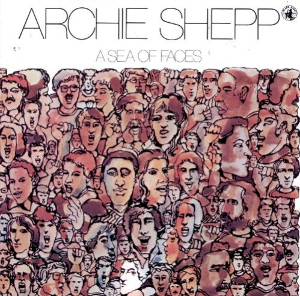
A Sea of Faces is an album by avant-garde jazz saxophonist Archie Shepp recorded in Milan, Italy, on August 4 and 5, 1975, and released on the Italian Black Saint label. It features performances by Shepp with Charles Greenlee, Dave Burrell, Cameron Brown, Beaver Harris, Rafi Taha and Bunny Foy.

Body and Soul is an album by jazz saxophonist Archie Shepp recorded in Rome, Italy, on September 28 and October 16, 1975, and released on the Horo Records label.

Jazz a Confronto 27 is an album by jazz saxophonist Archie Shepp recorded in Rome, Italy, on September 28. 1975, and released on the Horo Records label as part of the "Jazz a Confronto" series.
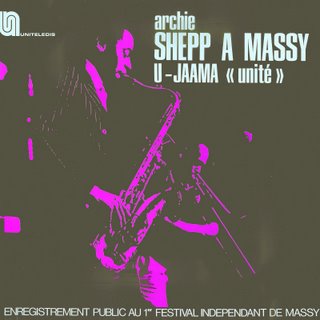
U-Jaama (Unite) is a live album by jazz saxophonist Archie Shepp recorded at Massy in 1975 and released on the French Uniteledis label as a double LP.
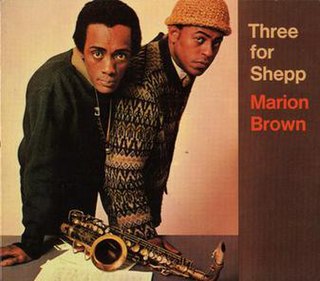
Three for Shepp is an album by American saxophonist Marion Brown featuring performances recorded in 1966 for the Impulse! label.

Hi-Fly is a 1976 album by jazz singer Karin Krog and saxophonist Archie Shepp.

Lover Man is an album by saxophonist Archie Shepp's Quartet with vocalist Annette Lowman which was recorded in Holland in 1988 and released on the Timeless label the following year.
